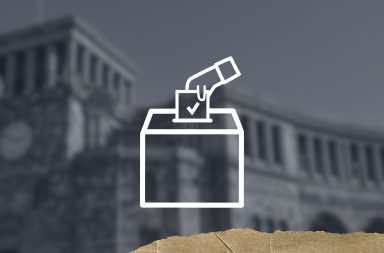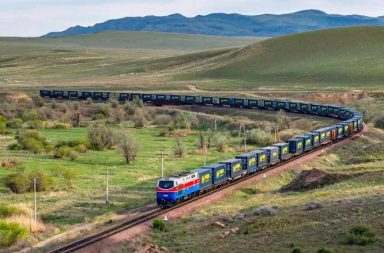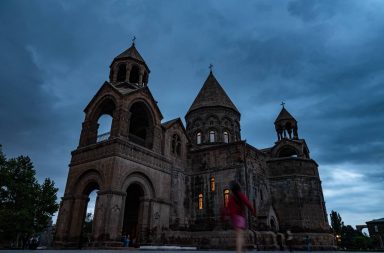German journalist Florian Werner from the conservative weekly newspaper Junge Freiheit in Berlin recently interviewed Davit Beglaryan, Editor-in-Chief of 301, about the platform’s mission, origins, and place in Armenia’s media landscape.
Beglaryan explained that 301 takes its name from the year 301 AD, when Armenia became the first nation to adopt Christianity, symbolizing the enduring connection between Armenian faith, identity, and resilience. The outlet was founded during the 2020 Artsakh War as a grassroots digital initiative to counter misinformation and provide Armenians and the diaspora with accurate, real-time updates during the conflict.
He noted that 301’s strong criticism of the government stems not from partisanship but from a commitment to accountability, independence, and national integrity. Unlike many Armenian outlets with political or financial affiliations, 301 operates without external influence, earning both praise and hostility from traditional media and pro-government figures.
Beglaryan acknowledged facing political pressure—particularly over coverage of the “Tavush for the Motherland” movement—but emphasized that independence and credibility remain central to their editorial philosophy.
Commenting on Armenia’s political trajectory, Beglaryan said the optimism of the 2018 “Velvet Revolution” under Nikol Pashinyan has been replaced by authoritarian tendencies, weakened sovereignty, and social division. He pointed to the loss of Artsakh, Azerbaijani occupation of Armenian territory, political prisoners, and attacks on the Armenian Church as indicators of deep national crisis.
According to Beglaryan, the government that once promised reform has instead delivered “monumental incompetence and political degeneration,” leaving Armenia at one of the most critical junctures in its modern history.
Below is the full interview:
- For our German readers, first of all: What does the name “301.am” mean?
The name 301.am is both symbolic and functional. The numeral 301 refers to the year 301 AD, which was the year that Armenia became the world’s first state to officially embrace Christianity as a religion. This change did not impact only religious life, but it took deep roots in Armenian identity, being the pillars of our national consciousness, traditions, and values. It is here that the Armenian Apostolic Church as a unifying force came to guide the people through centuries of sufferings, foreign occupation, and turmoil. To the current day, the Church remains one of the most enduring symbols of Armenia’s culture, history, and resilience — an indicator of how faith and identity have been inseparably interwoven in the Armenian experience. By choosing the name 301.am, we wanted to bring our platform back to this rich heritage, but reinterpret it in a new form that speaks to modern Armenia and the world at large through virtual space. - Your news outlet was founded in 2020 in the midst of the fighting over Nagorno-Karabakh. What motivated you to do journalism in wartime?
The decision to establish 301.am in 2020 was entirely born out of the war. In the fury of conflict, information becomes as vital as food or medicine; it can protect people, help make decisions, and determine how people in the world understand what is happening. During the Nagorno-Karabakh war (2020 Artsakh war), we witnessed a deluge of misinformation and propaganda that muddied the public’s perception. It is important to note that we were not professional journalists; we were just ordinary young people who felt an obligation to fill that void. Initially we started on Twitter (now X) because that was the quickest, most direct way of communicating with both the Armenian diaspora and people on the international stage. On such an open platform we could provide updates in real time, verify false claims, and make Armenia’s voice heard beyond our borders. To our surprise, it did not take long before people started following and sharing everything we posted, and our Twitter account became a trusted source throughout the volatile weeks ahead. We learned that there is a level of urgency in modern narratives, and the power of digital platforms in shaping those narratives. 301.am developed out of a Twitter initiative to a full-scale movement and organization. Launching in wartime was not only about starting a news outlet, but it was also a moral obligation, a means to document reality, and a way to stand with our people, with the understanding that every single word and story mattered. - Compared to other Armenian media outlets, your news outlet stands out for its outright criticism of the government. Why is that?
We don’t see ourselves as being “anti-government” for its own sake. Our approach is rooted in principles and in what we believe is best for the Armenian people and their homeland, especially when it comes to national security, sovereignty, and long-term stability. From the start, we have believed that independent media must not serve power but instead question it and hold it accountable. In Armenia, too many outlets are politically tied, financially dependent, or hesitant to publish stories that may put those in power on the defensive. That leaves too many difficult truths unaddressed. As outsiders to political structures, we have the freedom to ask the hard questions and publish the stories others avoid. For us, scrutiny is not negativity — it is responsibility. If there are mistakes, negligence, or policies that weaken our homeland, we see it as our duty to call them out. Remaining silent would be complicity. That’s why 301.am is different. We don’t self-censor or operate to appease political forces. Our work is grounded in transparency, truth, and the conviction that the Armenian people deserve accountability from those in power. If that means facing pressure or being unpopular, so be it — because the ultimate goal is to safeguard the future of Armenia. - How do the long-established media outlets in Armenia react to your work?
Media and journalism in Armenia is a very mixed field. We try to be more than just another media outlet. Our goal is to educate, inform, and serve a broader purpose — one that goes beyond simply reporting the news. We are not under the influence of a political figure, nor are we beholden to a specific funding organization. This independence allows us to pursue stories freely and hold power accountable without fear of losing access or support. Naturally, this position has earned us both recognition and criticism. Some view us as a new and disruptive voice moving journalism forward, while others dismiss or attack our work precisely because we do not play by the traditional rules of Armenian media. Pro-government outlets, in particular, often target not only us but any platform that questions those in power, creating an atmosphere where independent journalism is easily painted as “provocative” or disloyal. Even so, our openness in addressing inconvenient truths has also earned us respect among readers and colleagues who value independence. Our relationship with the established media is therefore complex — a mix of competition, distrust, and, from some, acknowledgment of the role 301.am plays in raising the standard of journalism in Armenia. - Have you had any problems with the authorities because of your comparatively positive reporting on the “Tavush for the Motherland” movement?
Yes, it does seem that our reporting on the “Tavush for the Motherland” opposition movement has drawn scrutiny. Our reporting was more favorable compared to other news outlets, because we reported on the civic engagement and political engagement of this surrounding opposition group, but we still drew scrutiny because we don’t have editorial control from government entities and therefore don’t have to have an allegiance to the current government. In Armenia, even neutral or favorable reporting of an opposition movement can create pressure from pro-government actors. In our case, the pressure did not come via official censorship, rather pro-government activists and members of parliament like the current Minister of Labor and Social Affairs, Arsen Torosyan. They have criticized our coverage in a public forum, have tried to delegitimize our platform and, more critically, fomented an environment of public hostility around our coverage. This situation exemplifies what it means to be an independent journalist in Armenia, in the sense that even fair reporting of opposition activity can come under scrutiny. For us, it emphasizes the importance of a strict editorial policy, the importance of transparency, and the importance of credibility – so that we can at least inform readers without inaccuracies despite pressures. - Prime Minister Nikol Pashinyan was elected to office in 2018 following the #MerzhirSerzhin protests. That was not too long ago. What has changed since then? Has the tide turned politically?
Nikol Pashinyan’s assumption of office in 2018 after the #MerzhirSerzhin protests represented a hope for substantial change to many Armenians. People hoped for transparency, reform, and a break from buried political corruption for decades. In fact, this hope was betrayed quickly. The government’s early promises were primarily pronouncements, and the leadership ‘s substantial inexperience, hesitancy, and priority of political survival, over priority of urgent care. Instead of uniting and fixing a fragmented society, the administration and leadership administration in the early days claimed divisions. The leadership acted with populist impulse that drove fiscal and policy decisions, even as the strategic and existentialism needs both internally and externally were ignored. There was early optimism, but that optimism very quickly from the outset and early days gave way to frustration over no matched results for rhetoric. In the meantime things have worsened significantly. The loss of Artsakh in 2020-2023 was catastrophic, it included what many described as ethnic cleansing in that area and has deeply impacted the conscience and security of the benefit. Matter of fact, Azerbaijani forces are currently occupying over 200 square kilometers of Armenian sovereign territory, and have posed even more of a threat to the nation’s sovereignty. Democratic institutions are crumbling as the power becomes more authoritarian. Power has become increasingly centralized, with authority concentrated in the hands of the regime rather than distributed to serve the needs and interests of its citizens. Dissenting voices are frequently punished or suppressed—for instance, there are currently more than 30 political prisoners in Armenia, including high-ranking clerics. Attacks on the Armenian Church, a cornerstone of Armenian culture and national identity, further exemplify a broader assault on the moral and spiritual fabric of the nation. On top of these challenges, the authorities continue to downplay the Armenian Genocide, a stance that frustrates both citizens and the international community. To put it succinctly, Pashinyan’s rise to power was once heralded as a momentous event of popular mobilization; the reality now is one of monumental incompetence, national trauma, and political degeneration. The optimism of 2018 has mostly been morphed into mistrust, compromised sovereignty and the unsettling dissipation of democratic, cultural, and moral norms. Factors such as military defeat, a pressing occupation, internal instability, and the attacking of national institutions have rendered Armenia on the brink of one of its most critical moments in its recent history.


